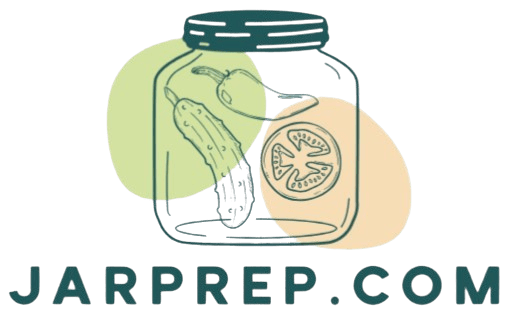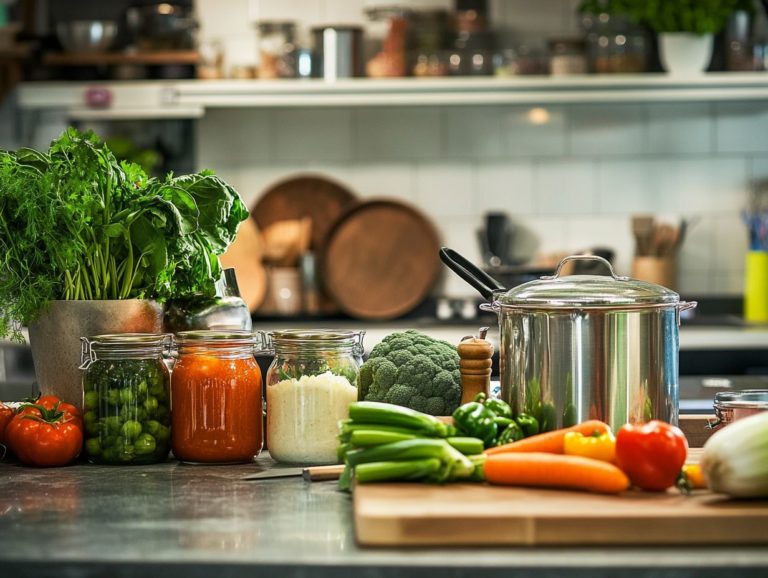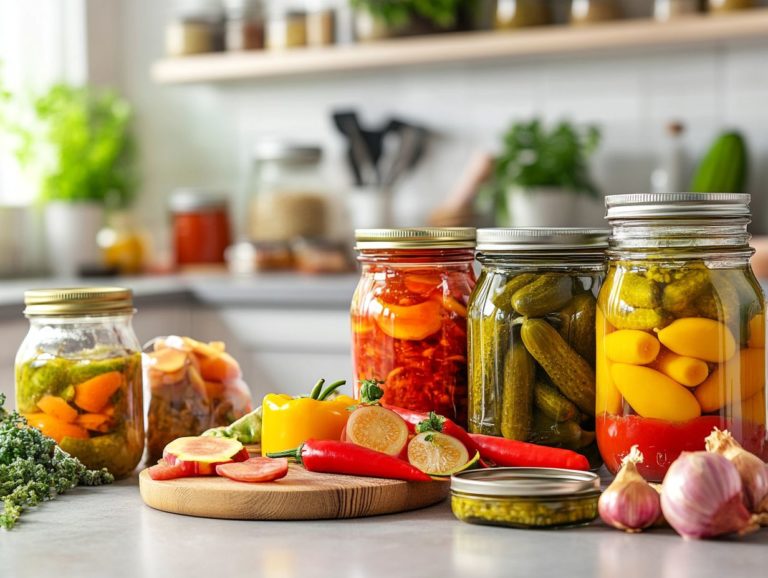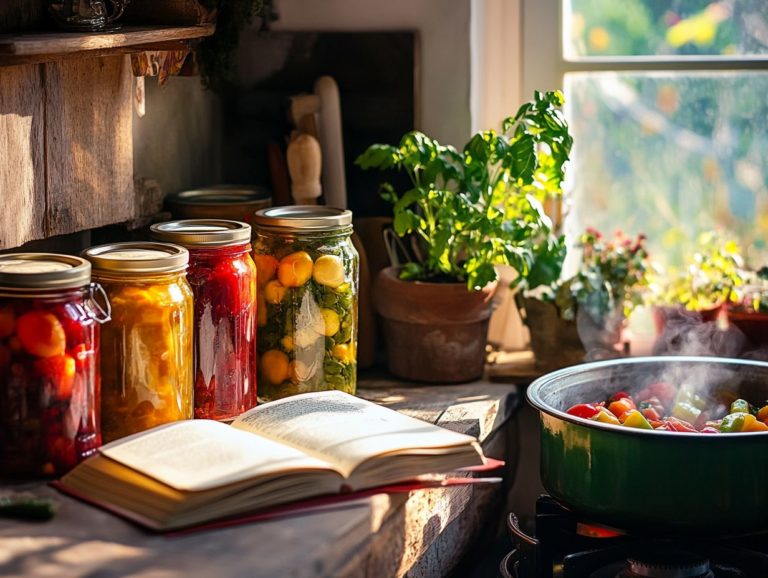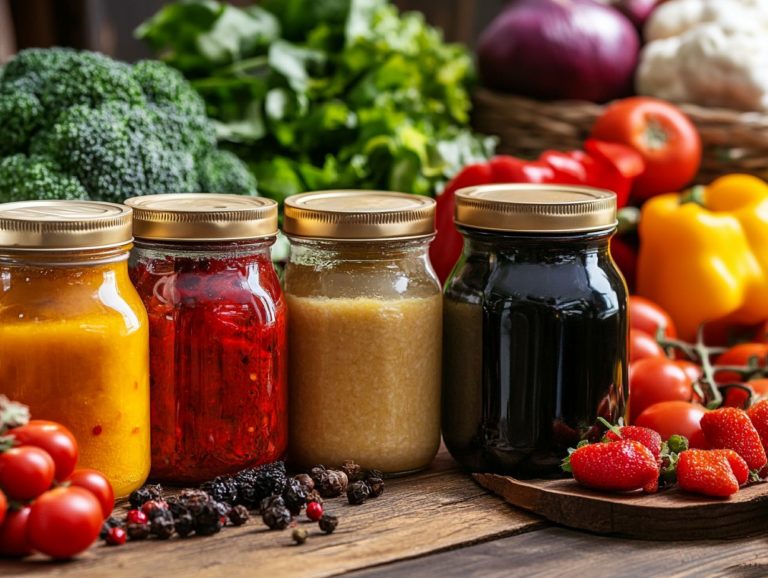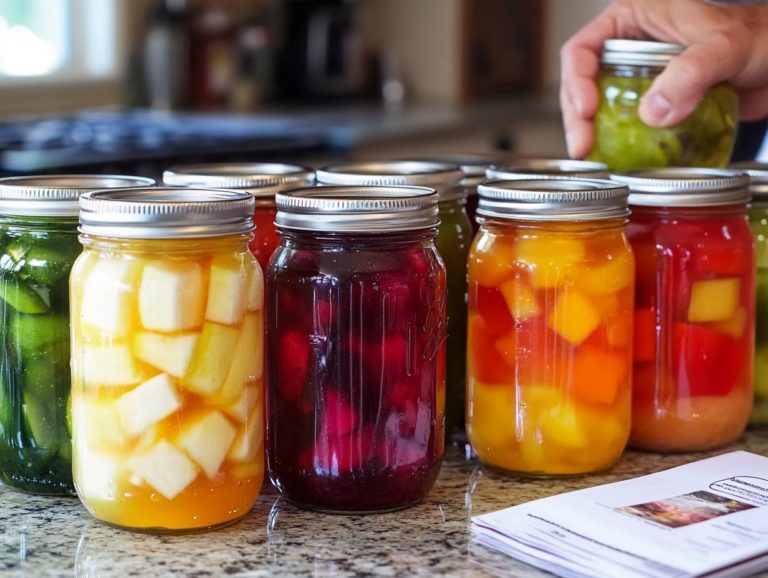How to Make Sure Canned Food is Safe?
Canned food is a staple in many households, offering convenience and a long shelf life. But what is canned food, and which types are commonly found in grocery stores?
While canned food presents various advantages, it also comes with certain drawbacks. This article explores essential information about canned food safety, helping you identify spoilage and contamination, along with tips for safe handling and preparation.
Whether you ve loved canned food for years or are just curious, you re bound to find valuable insights here.
Contents
Key Takeaways:
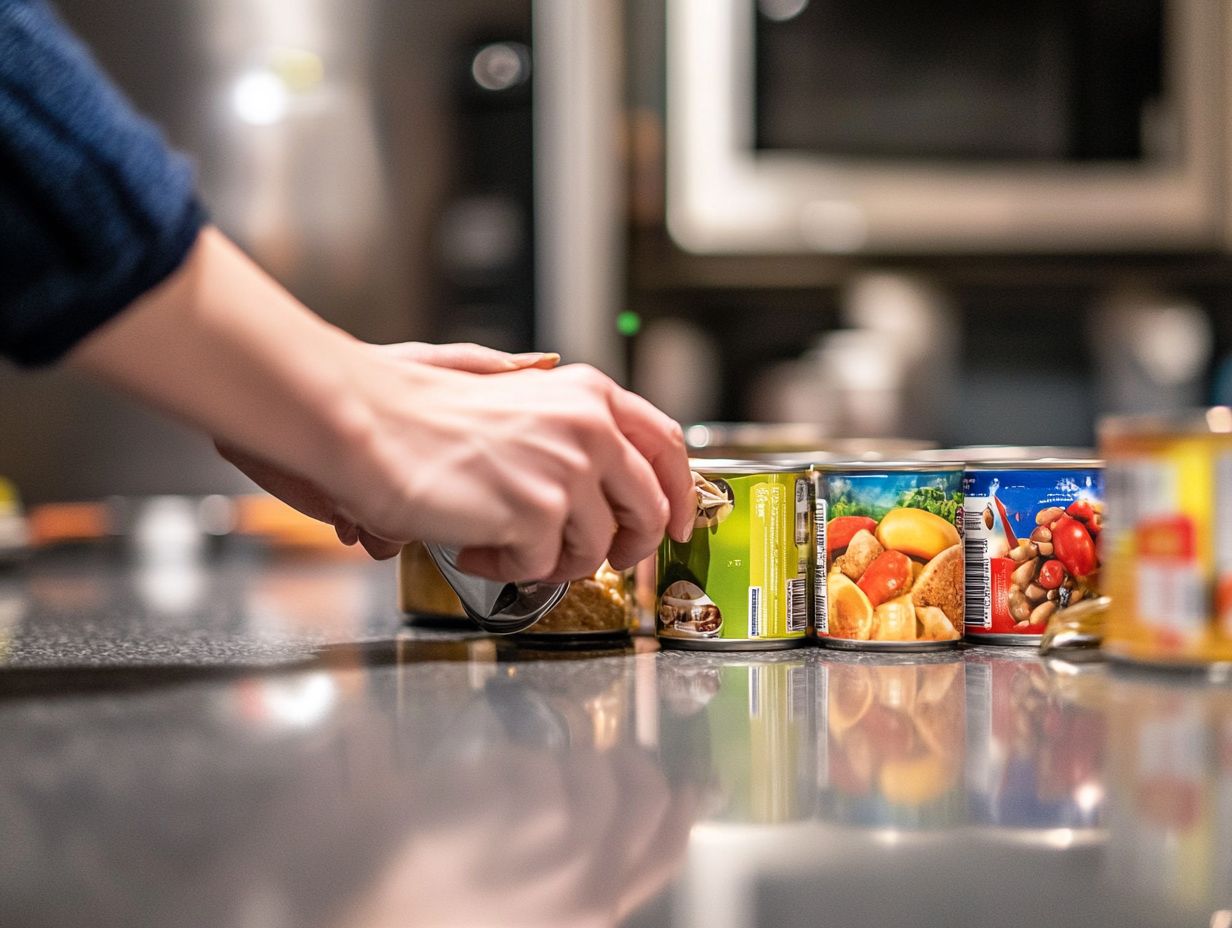
- Check for signs of spoilage and contamination before consuming canned food.
- Handle and prepare canned food safely to avoid contamination and foodborne illnesses.
- Store canned food properly and consume it within its shelf life to ensure safety.
What is Canned Food?
Canned food refers to a method of food preservation where food is sealed in airtight containers. This process extends its shelf life and prevents spoilage. It includes a variety of products such as fruits, vegetables, and meats, making it an excellent option for families looking to maintain an emergency food supply.
To effectively navigate canned food, understanding the difference between foods with high acidity, like tomatoes, and low-acid foods, such as vegetables, is crucial. This knowledge is essential for ensuring safety and quality, especially during home canning, which can help reduce the risk of food poisoning from botulism.
Definition and Common Types
Canned food includes items that have been processed, sealed, and stored in airtight containers. This allows them to stay fresh and usable for a long time.
Products range from fruits like peaches and pears to vegetables such as green beans and corn, and proteins like meats and seafood, including tuna and salmon.
Understanding the difference between high-acid and low-acid foods is vital for safe canning. High-acid foods, like tomatoes and citrus fruits, can be preserved with a boiling water bath. In contrast, low-acid foods like green beans and meats require pressure canning for safety.
Both methods effectively eliminate harmful bacteria, ensuring your canned items remain safe and delicious for a longer time.
Benefits and Drawbacks of Canned Food
Canned food offers numerous benefits, including unmatched convenience, a long shelf life, and access to a variety of healthy options year-round. This makes it a key component of food preservation strategies for many households.
However, it s important to recognize potential drawbacks, such as nutrient loss during the canning process and food safety issues if proper techniques aren t followed.
Pros and Cons of Canning Process
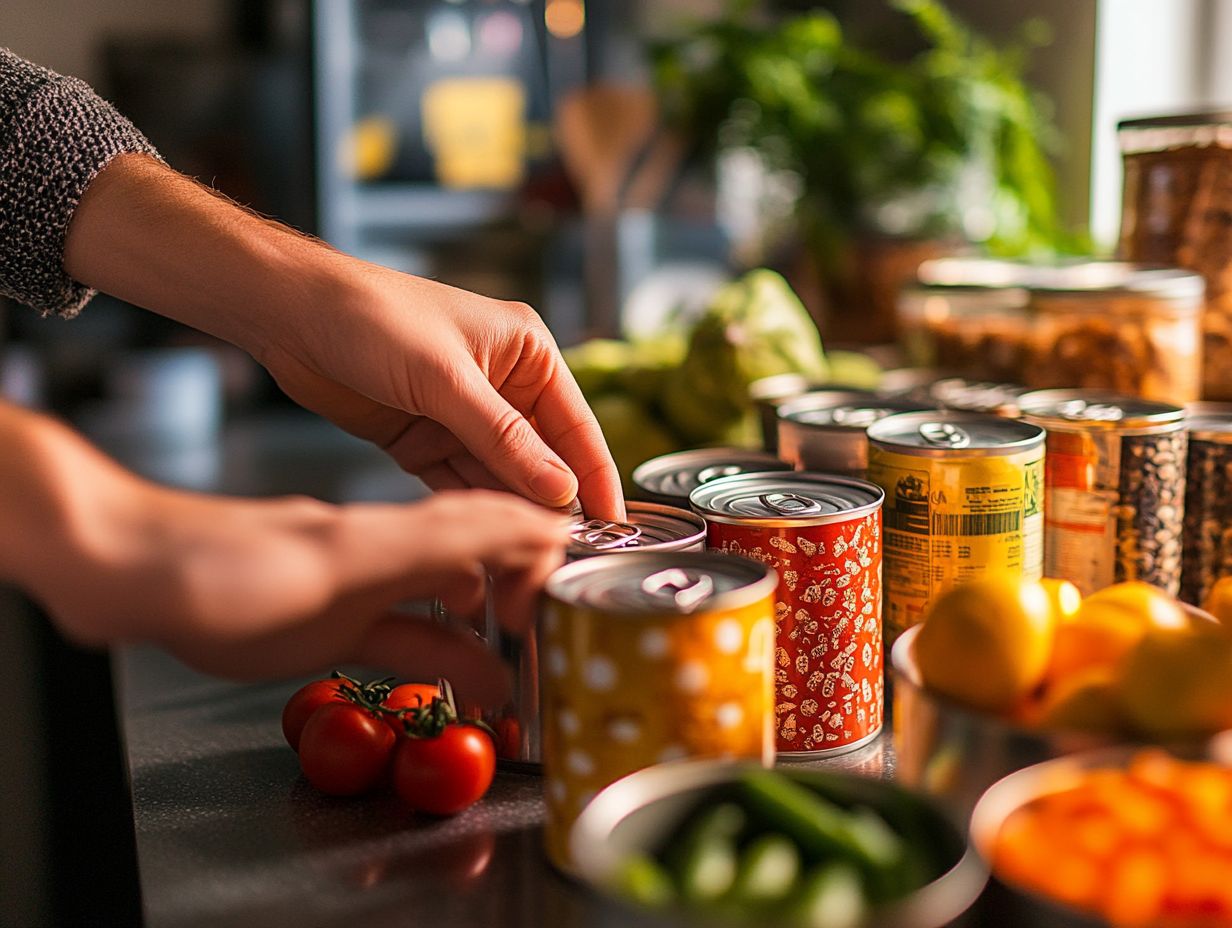
Canning has its pros and cons. It lets you enjoy seasonal foods throughout the year. However, there are risks, such as botulism, if proper canning techniques are not followed.
One notable benefit of canning is convenience, allowing you to savor fruits and vegetables all year round, regardless of the harvest season. It can also be a cost-effective way to stock up on nutritious foods, helping to reduce overall grocery bills by taking advantage of bulk purchases.
Yet, neglecting safety during the canning process can lead to foodborne illnesses, which is a serious concern. Mastering the correct methods and using the right equipment is essential. This diligence minimizes risks and allows you to enjoy home-preserved foods safely while gaining financial and nutritional benefits.
If you’re interested in canning at home, explore various techniques and recipes to get started!
Factors Affecting Canned Food Safety
The safety of canned food hinges on several key factors, including storage conditions, the quality of ingredients, and following safe canning methods. Understanding how to properly store canned foods is essential, as each of these elements plays a vital role in determining shelf life and preventing spoilage.
Understanding these components is crucial for ensuring your home-canned foods remain safe and delicious over time.
Storage Conditions and Shelf Life
Optimal storage conditions are essential for maximizing the shelf life of your canned goods and preventing spoilage. Key factors such as temperature, light, and humidity play significant roles in food safety.
Store canned foods in a cool, dry place. Ideal temperatures are between 50 F and 70 F. Direct sunlight can degrade the contents, so keep your cans in a dark or shaded area.
High humidity can lead to rust formation on the cans, compromising the seal and allowing air and moisture to seep in. Regularly check your pantry conditions and consider using airtight containers for added protection against humidity.
By adopting these practices, you can ensure that your canned goods remain safe and flavorful by learning how to store opened canned goods safely for as long as possible.
How to Tell if Canned Food is Safe to Eat
To determine whether canned food is safe to eat, you need a discerning eye and a meticulous inspection for any signs of spoilage or contamination. Knowing how to tell if canned food is bad is crucial, as certain indicators can signal the risk of foodborne illness, making it essential to be vigilant.
Mastering the evaluation of your home-canned foods effectively safeguards your health and ensures your meals are enjoyable and safe for consumption.
Signs of Spoilage and Contamination
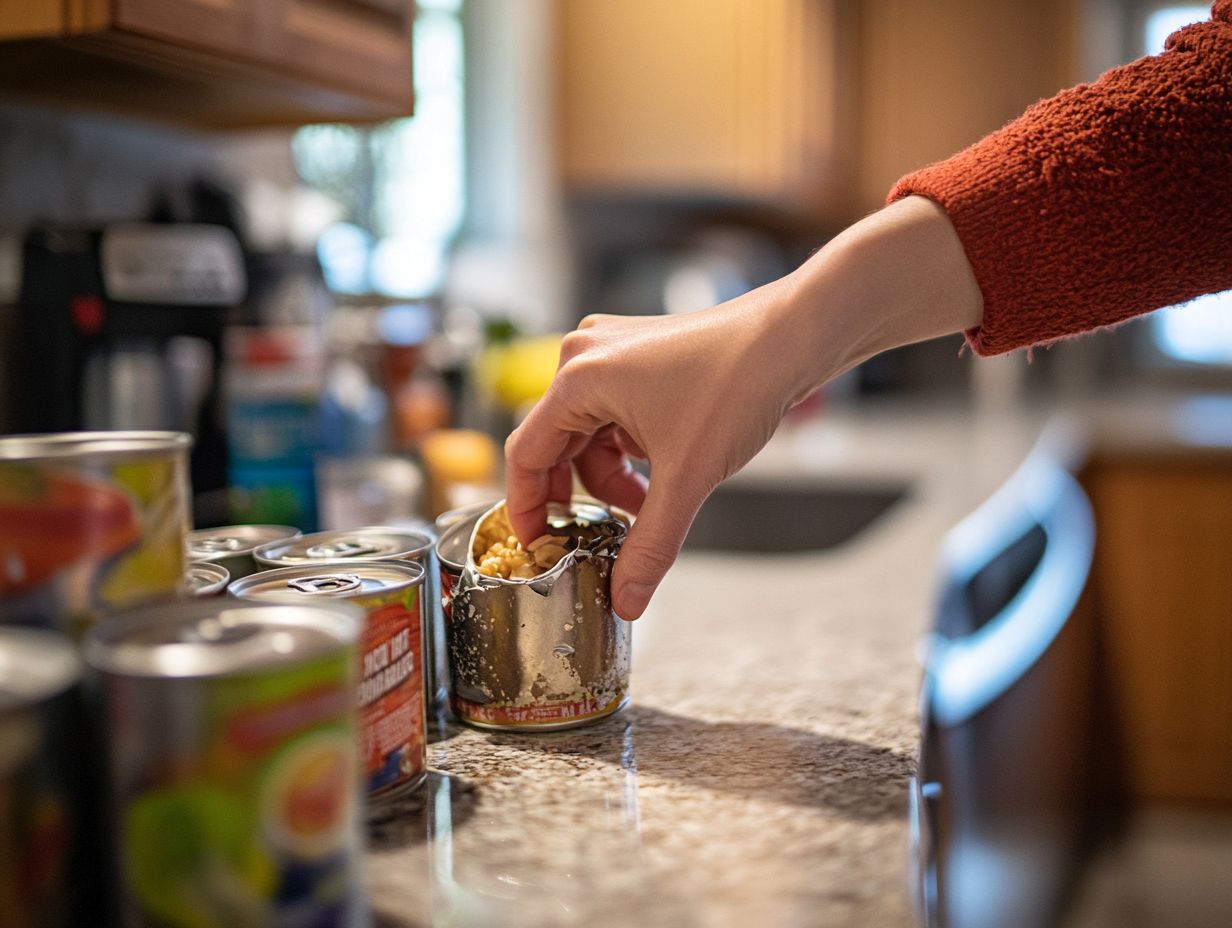
Keep an eye out for signs of spoilage and contamination like bulging lids, off odors, or discoloration. These indicators are vital warnings of potential foodborne illness.
Don t underestimate these signs; they often suggest the presence of harmful bacteria, which can pose serious health risks. Also, check the can for rust, as this can compromise the seal, increasing the likelihood of spoilage.
If you notice a can that s leaking or dented, don t risk your health always throw out any questionable cans!
Proper handling techniques are essential. Always check expiration dates and store canned goods properly in a cool, dry place to enhance food safety and prevent unfortunate incidents.
Preventing Contamination and Foodborne Illnesses
Preventing contamination and foodborne illnesses requires your commitment to strict food safety practices and careful handling techniques. This is especially crucial when you re diving into home canning or using canned goods in your kitchen.
Proper Handling and Preparation Techniques
Proper handling and preparation techniques are essential for preventing contamination and ensuring the safety of canned foods, particularly in home canning.
Good hygiene is crucial; wash your hands thoroughly and ensure all your equipment is sanitized before starting. Temperature control also plays a critical role foods must be heated to the right temperature to eliminate harmful bacteria.
By following these fun food safety tips like using fresh ingredients, checking for spoilage, and storing your canned goods in a cool, dry place, you greatly enhance both the quality and safety of your final product. Additionally, be sure to consider what safety measures to take in canning for optimal results.
Enjoy the joys of home-canned foods without the nagging concern of contamination or spoilage!
Frequently Asked Questions
What is the best way to ensure canned food is safe to eat?
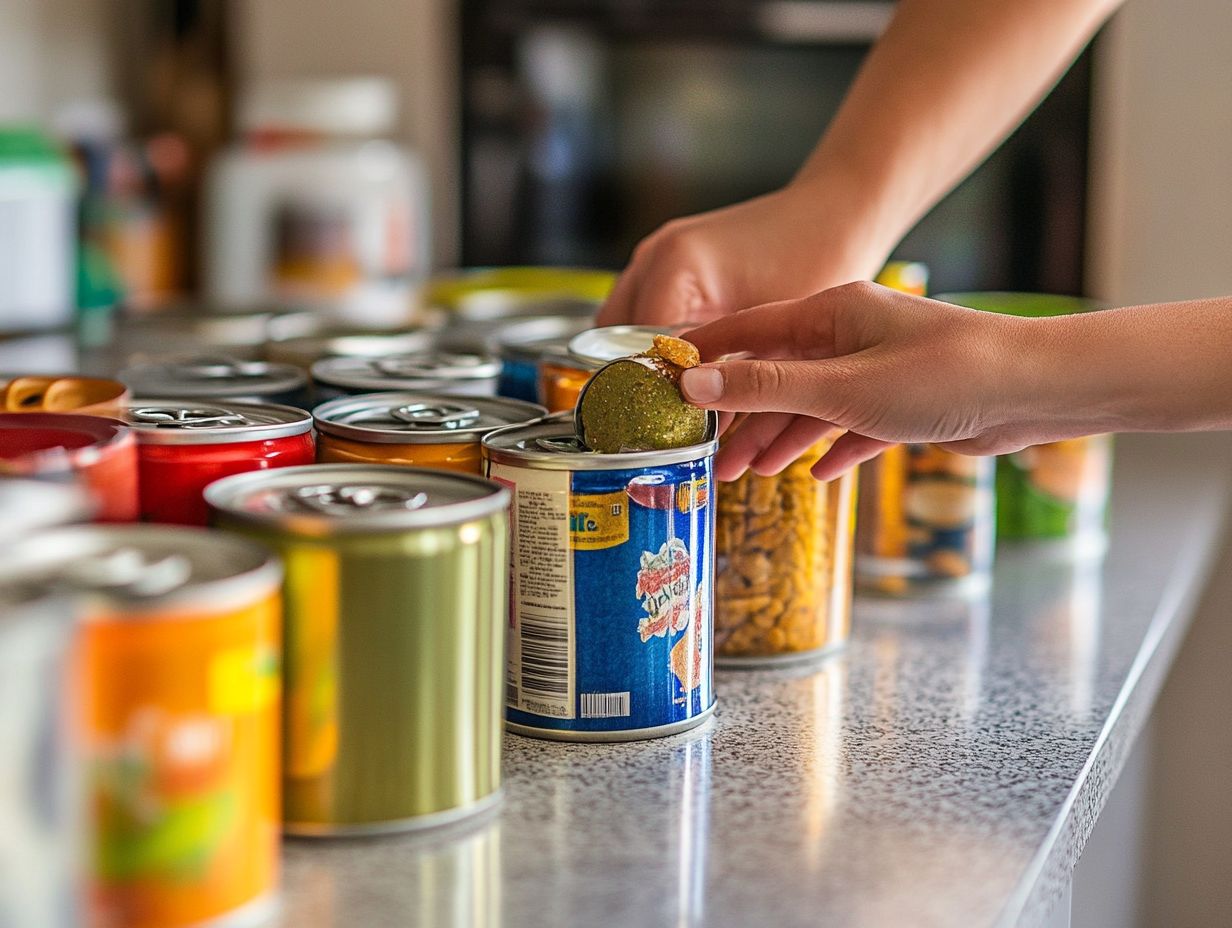
The first step is to always check the expiration date on the can. If the food is past its expiration date, do not consume it. Additionally, make sure the can is not dented, swollen, or leaking, as these are signs of potential contamination. If you encounter any issues, refer to this guide on how to safely open faulty canned goods.
Check your canned goods today and ensure they’re safe for your next meal!
How can I tell if canned food has gone bad?
Check the expiration date and inspect the can closely. If you’re interested in ensuring the safety of your canned goods, learn how to prevent mold in canned foods, as well. If the food smells off or looks odd, it’s best to throw it away.
When you open the can, if the food spurts out or feels strange, it s likely spoiled.
Is it safe to eat dented cans of food?
It’s usually not safe to eat from dented cans. Dents can damage the seal and let bacteria in.
If the dent is minor and the can looks intact, it might still be okay to consume the food.
Should I always cook canned food before eating it?
Most canned food is pre-cooked and can be eaten straight from the can. However, if you’re unsure about the safety, it’s wise to test seals on canned goods or heat it up first to kill any potential bacteria.
Can canned food go bad even if it is unopened?
Absolutely! Canned food can spoil, even when unopened. Always check the expiration date to ensure its quality.
Over time, the food’s quality can decline, making it unsafe to eat.
What should I do if I accidentally consume spoiled canned food?
Don t wait! If you feel sick after eating, seek medical help right away.
Reporting the incident to the manufacturer and your local health department is also crucial to prevent more cases of contamination.
